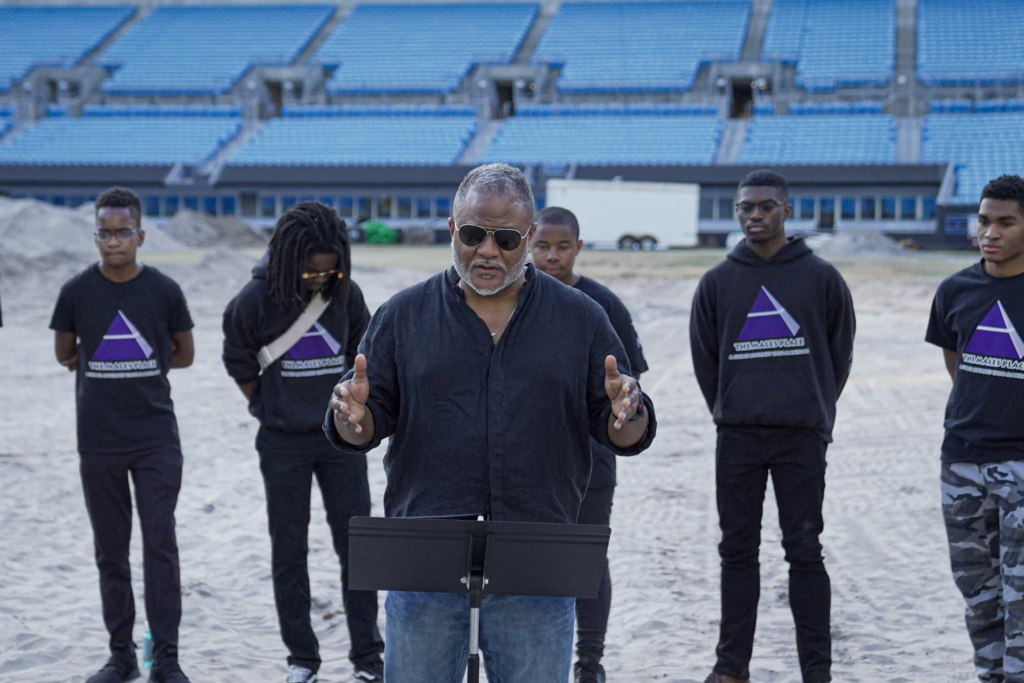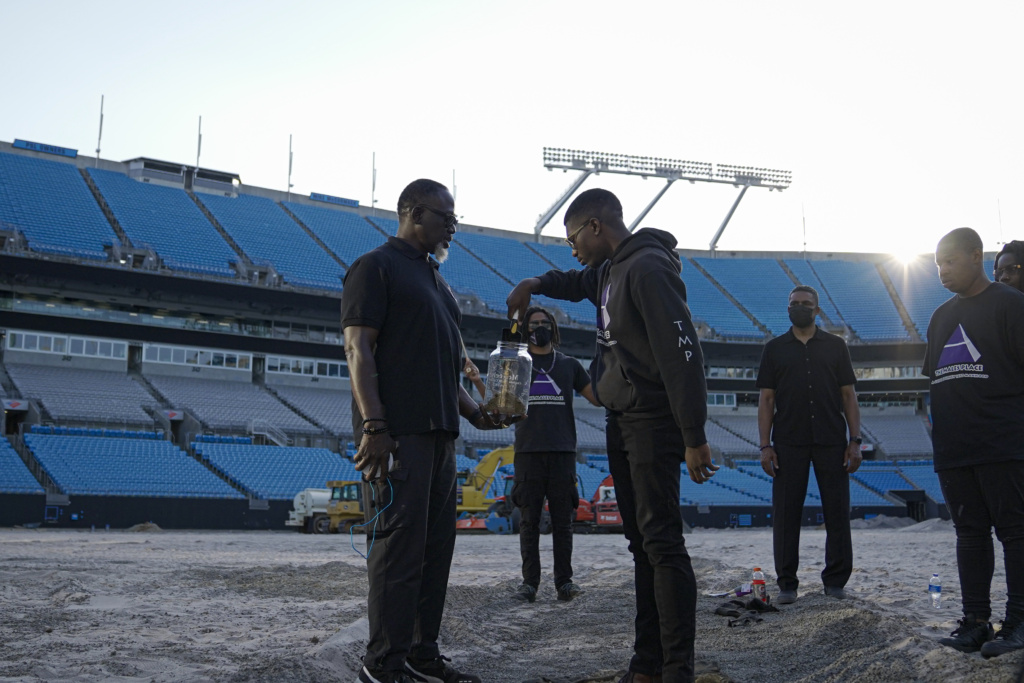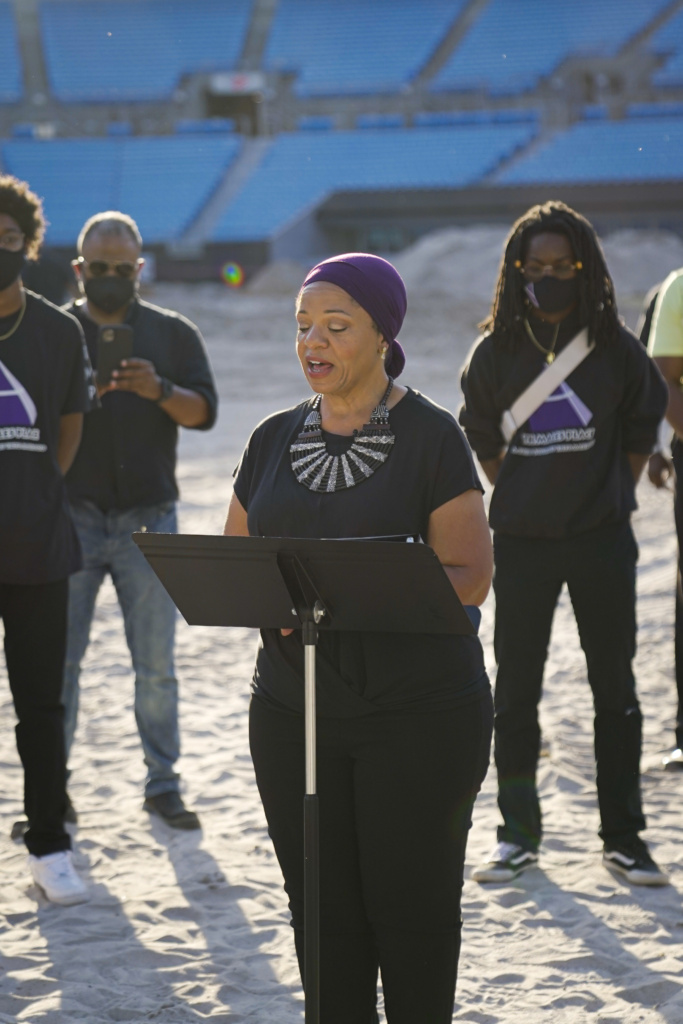Memorializing Joe McNeely
Soil was collected from the site of his death on May 20, 2021, in a somber, small ceremony marked by truth-telling and hope. Next will come a marker, on the grounds of Bank of America Stadium.
The young Black men stood solemnly in a curved line, each in his turn stepping forward to sink a trowel into the soil at one end of Bank of America Stadium, home of the NFL’s Carolina Panthers and MSL’s Charlotte FC. Each placed the soil into a glass jar.
A libation was poured, in remembrance of those who came before, honoring ancestors, both named and in the collective.
A story was told: Spoken words evoking the life of young Joe McNeely, and his death, ending with a call for this community to tell the truth of it: that Joe McNeely was shot to death by a mob of white men, none of whom were ever held accountable, in Mecklenburg County’s first documented racial terror lynching. It happened on the street in front of Good Samaritan Hospital, a place on which the stadium now stands.
Slowly, the soil filled the jar.
A young man read a poem next, “If We Must Die,” and a prayer was made: “How long, oh Lord?”
After the ceremony, as part of an ongoing national project, some of the soil traveled to Montgomery, Alabama, to rest in the Equal Justice Initiative’s Legacy Museum. There, it joined soil from the sites of other racial terror lynchings: Nearly 6,500 between the end of the Civil War and 1950 have been documented by EJI in its reports “Lynching in America” and “Reconstruction in America.”
And the City of Charlotte and Tepper Sports & Entertainment have committed to erecting a historical marker for Joe McNeely on stadium grounds. (Go to “Stay Connected,” below, to sign up for updates.)
Some of those who participated in this somber private ceremony described what they felt, and what they believe the sharing of this history can do:

Rev. Dr. Rodney S. Sadler Jr., associate professor of Bible and director of the Center for Social Justice and Reconciliation at Union Presbyterian Seminary, offered a prayer that day.
“What moved me most deeply about today was seeing the young men as part of The Males Place marching out here, standing strong and bearing witness. … to see these young African-American men connecting with their history.
“The unexpected part was the deep sentiment associated with the experience. Seeing the people, everyone that was here participating in the service – they were connected deeply to what happened in this place and this larger notion that we as African-American people want a better future. We don’t want the kind of things that have happened in our past to continue. We want racial justice, we want truth. …
“These are rituals, and rituals help people to deal with pain, with grief, with suffering. A ritual like this will help to contextualize it. This happened here, in this place. I think it’s particularly significant that we’re in the middle of a place that’s used for celebration, a place for jubilation – but to realize that in this space, other things happened…
“This is true for all of America.
“It’s good to remember that all of this came with a cost, and all of it cost a lot of blood. This was a significant and moving experience. …
“May this end with us.”
— Rev. Dr. Rodney S. Sadler Jr.

Warriors of The Males Place, a local Black manhood training program, took part in the ceremony.
“(Before this day) I didn’t know that right here, on this ground, where I went just about a year ago to watch the Panthers play against the Patriots, an unfortunate Black man was just lynched here. I wouldn’t have known that until – well, just now.
“The feeling of today? Remorse. It’s like a feeling in your gut: That could be me. If you make one wrong step, one misplay, you’re just going to fall, and fall hard.”
— Adonis Adams, The Males Place

Soil filled the jar with Joe McNeely’s name and death date.
“I’m in African-American History Studies. I’ve heard about stories just like this. It doesn’t surprise me how these heinous acts were carried out…
“I definitely think that the soil collection and Joe McNeely recognition will really help people in Charlotte understand the history behind what really happened in Charlotte.”
— Xavier Brown, The Males Place

Prayer, poetry, a libation: All were part of the soil collection for Joe McNeely.
“What moved me most deeply today (was) the fact that even after 100 years, we still – we didn’t let this just fly by like we normally do other things. We still made it a point to put this out to the public and let them know that this is not OK, that this type of action, even 100 years ago, is not OK.
“Just being able to learn more about the past of Charlotte: I feel as though that in itself is already helping people get a better understanding.”
— Nyjhol Bien-Aime, The Males Place

Elisa Chinn-Gary, co-founder of Race Matters for Juvenile Justice, spoke of McNeely. / All photos on this page by Loyd Visuals
“It is an honor to have this ceremony, to restore his dignity, to restore his humanity, to restore his honor and nobility, and I think we accomplished that today.”
“We stand here nearly 108 years later. There were people who mourned (then), there were people who were in shock, there were people whose hearts cried out. No one probably thought that 108 years later Joe McNeely would still be significant. But he is. And every life lost in between that time is significant.”
“One thing that was unexpected for me is a feeling of joy. I had the expectation that I would be overwhelmed with a sadness. I was not. I believe in ancestral spirits connecting and guiding people of color. And I know that those spirits were with us today.”
“I believe – and one of the philosophies of EJI is that – we will never get to a place of true healing, true reconciliation, until the truth is told. Today we stood as truth tellers.”
— Elisa Chinn-Gary
The CMRP thanks The Males Place for participating in the marking of this history: Adonis Adams, Cole Allen, Jayden Battle, Nyjhol Bien-Aime, Varnell Bien-Aime, Xavier Brown, Jason Chambers, Crawford Deveaux, Supreme Deveaux, Marcus Gillespie, Isaiah McKeller, Isaiah Moore, A.J. Simmons, Ziaire Star-Dent, Zolani Stephens, Karlton Wizzart, Kingston Wizzart, Denzil Xavier, Saye Xavier and Reggie Singleton.


